- Chooses same journalist to take on the security agencies
Iram Salim
(Pak Destiny) Finally Nawaz Sharif himself has revealed who was bind the Dawn Leaks.
In a interview he gave to Dawn’s Cyril Almeida in today’s Dawn, Nawaz Sharif openly declared that none else but it was his camp behind the Dawn Leaks-I in Oct 6, 2016.
Like in Dawn Leaks-I the Nawaz camp again chose its man in Dawn – Cyril Almeida – for the Dawn Leaks-II (May 12, 2018) in which Nawaz Sharif again took on the security agencies for their failure to take action against homegrown militant group. He also talked three parallel governments in country – one that of civilian, other military and third that of judiciary.
Read the contents of Oct 6 Dawn Leaks-I and May 12 Dawn Leaks-II both from the pen of Almeida it is very much clear who was talking off the record in the Dawn Leaks-I and who is speaking on the record in the Dawn Leak-II.
It seems Nawaz Sharif and his close aide Pervaiz Rashid have decided to openly tell the people that they were behind the Dawn Leak-I and they are not afraid to disclose this in Dawn Leaks-II.
Read both Dawn Leaks-I And Dawn Leaks-II decide by yourself
Dawn Leaks-I
By Cyril Almeida
Oct 6, 2016
ISLAMABAD: In a blunt, orchestrated and unprecedented warning, the civilian government has informed the military leadership of a growing international isolation of Pakistan and sought consensus on several key actions by the state.
As a result of the most recent meeting, an undisclosed one on the day of the All Parties’ Conference on Monday, at least two sets of actions have been agreed.
First, ISI DG Gen Rizwan Akhtar, accompanied by National Security Adviser Nasser Janjua, is to travel to each of the four provinces with a message for provincial apex committees and ISI sector commanders.
The message: military-led Intelligence agencies are not to interfere if law enforcement acts against militant groups that are banned or until now considered off-limits for civilian action. Gen Akhtar’s inter-provincial tour has begun with a visit to Lahore.
Second, Prime Minister Nawaz Sharif has directed that fresh attempts be made to conclude the Pathankot investigation and restart the stalled Mumbai attacks-related trials in a Rawalpindi antiterrorism court.
Those decisions, taken after an extraordinary verbal confrontation between Punjab Chief Minister Shahbaz Sharif and the ISI DG, appear to indicate a high-stakes new approach by the PML-N government.
The following account is based on conversations with Dawn of individuals present in the crucial meetings this week.
All declined to speak on the record and none of the attributed statements were confirmed by the individuals mentioned.
Foreign secretary’s presentation
On Monday, on the day of the All Parties’ Conference, Foreign Secretary Aizaz Chaudhry gave a separate, exclusive presentation in the Prime Minister’s Office to a small group of civil and military officials.
The meeting was chaired by Prime Minister Sharif and included senior cabinet and provincial officials. On the military side, ISI DG Rizwan Akhtar led the representatives.
The presentation by the foreign secretary summarised the results of the recent diplomatic outreach by Pakistan, the crux being that Pakistan faces diplomatic isolation and that the government’s talking points have been met with indifference in major world capitals.
Examine: What should determine Pakistan’s foreign policy?
On the US, Mr Chaudhry said that relations have deteriorated and will likely further deteriorate because of the American demand that action be taken against the Haqqani network. On India, Mr Chaudhry stated that the completion of the Pathankot investigation and some visible action against Jaish-i-Mohammad were the principal demands.
Then, to a hushed but surprised room, Mr Chaudhry suggested that while China has reiterated its support for Pakistan, it too has indicated a preference for a change in course by Pakistan. Specifically, while Chinese authorities have conveyed their willingness to keep putting on technical hold a UN ban on Jaish-i-Mohammad leader Masood Azhar, they have questioned the logic of doing so repeatedly.
Extraordinary exchange
The foreign secretary’s unexpectedly blunt conclusions triggered an astonishing and potentially ground-shifting exchange between the ISI DG and several civilian officials.
In response to Foreign Secretary Chaudhry’s conclusions, Gen Akhtar asked what steps could be taken to prevent the drift towards isolation. Mr Chaudhry’s reply was direct and emphatic: the principal international demands are for action against Masood Azhar and the Jaish-i-Mohmmad; Hafiz Saeed and the Lashkar-e-Taiba; and the Haqqani network.
To that, Gen Akhtar offered that the government should arrest whomever it deems necessary, though it is unclear whether he was referring to particular individuals or members of banned groups generally. At that point came the stunning and unexpectedly bold intervention by Punjab Chief Minister Shahbaz Sharif.
Addressing Gen Akhtar, the younger Sharif complained that whenever action has been taken against certain groups by civilian authorities, the security establishment has worked behind the scenes to set the arrested free. Astounded onlookers describe a stunned room that was immediately aware of the extraordinary, unprecedented nature of the exchange.
To defuse tensions, Prime Minister Sharif himself addressed Gen Akhtar and said that policies pursued in the past were state policies and as such they were the collective responsibility of the state and that the ISI DG was not being accused of complicity in present-day events.
PM’s strategy?
Several eyewitnesses to the incredible events of Monday believe that the foreign secretary’s presentation and Chief Minister Shahbaz Sharif’s intervention were orchestrated by the prime minister to stir the military to action, leading to the decision to dispatch the ISI DG on an inter-provincial tour.
Yet, according to the accounts shared with Dawn, the sparring between the ISI DG and civilian officials did not degenerate into acrimony.
Earlier in the meeting, ISI DG Gen Akhtar stated that not only is it the military’s policy to not distinguish between militant groups, but that the military is committed to that policy prevailing. The ISI chief did mention concerns about the timing of action against several groups, citing the need to not be seen as buckling to Indian pressure or abandoning the Kashmiri people.
Gen Akhtar also readily agreed to tour the provinces at the direction of the prime minister, issue fresh orders to ISI sector commanders and meet with provincial apex committees to chalk out specific actions that need to be taken in various provinces.
According to several government officials, Monday’s confrontation was part of a high-stakes gamble by Prime Minister Sharif to try and forestall further diplomatic pressure on Pakistan. In separate meetings with the army chief, participants describe an animated and energised Mr Sharif, who has argued that Pakistan faces real isolation if policy adjustments are not made.
Government officials, however, are divided about whether Prime Minister Sharif’s gamble will pay off. According to one official, commenting on the ISI DG’s commitments, “This is what we prayed to hear all our lives. Let’s see if it happens.”
Another government official offered: “Wait till November to see if action will be taken. By then a lot of things will be settled.”
Military officials declined to comment.
Clarification:
The spokesman for Prime Minister Office on Thursday denied a story appearing in Dawn on Oct 6 regarding “purported deliberations” of a meeting held on security issues. The spokesman termed contents of the story not only speculative but misleading and factually incorrect, describing it as an “amalgamation of fiction and fabrication”.
Dispelling the impression created by the report, headlined “Act against militants or face international isolation, civilians tell military”, he said that intelligence agencies, particularly the ISI, are working in line with the state policy in the best interest of the nation, both at the federal and provincial levels to act against terrorists of all hue and colour without any discrimination. Indeed the Army’s and ISI’s role and contributions towards implementation of NAP have been proactive and unwavering, the spokesman said. Meanwhile, the office of the chief minister of Punjab also denied the comments attributed to Chief Minister Shahbaz Sharif in the news story.
Dismissing it as a baseless table story, he emphasised that besides his respect for the institution of the armed forces, on an individual level he also had the highest respect for the present ISI DG for his professionalism, commitment to duty and sincerity of purpose.
Published in Dawn, October 6th, 2016
Dawn Leaks-II
By Cyril Almeida
Published on May 12 2018
LAMBASTING the ongoing accountability process against himself and his family, former prime minister and PML-N supremo Nawaz Sharif has said: “You can’t run a country if you have two or three parallel governments. This has to stop. There can only be one government: the constitutional one.”
In a wide-ranging and exclusive interview with Dawn ahead of his rally in Multan on Friday, a relaxed but adamant Sharif dismissed the recent defections from the PML-N, particularly in southern Punjab. “They didn’t leave the party, they were taken away. Who took them away?” Mr Sharif asked.
“If there really was a mahaz (front), then why did it last only two days? Who forced them to immediately join PTI?” Mr Sharif continued.
The rally in Multan was his first visit to southern Punjab’s largest city since his ouster in last July and the former prime minister was keen to steer the interview back to his politics of grievance rather than discuss regional political dynamics.
He denied that the Jhelum rally earlier in the week signalled a possible slowdown in momentum or weakening of public support for him. “Perhaps it was a smaller ground, but it was packed to capacity,” said Mr Sharif. “It is a very popular slogan,” he said of ‘mujhe kyun nikala?’ and, added with evident satisfaction, “There is a lot of appreciation, a lot of recognition for it.”
Ex-PM denies a third ouster from the premiership represents a failed approach on his part, suggests he won’t do anything differently if returned to public office
The PML-N supreme leader also deflected questions about who will lead the party in the upcoming general elections campaign and whether his brother, Shahbaz Sharif, will be the prime ministerial candidate. Instead, he offered: “There is a lot of appreciation for Shahbaz Sharif. Look around this city and see how it’s totally transformed.”
The ex-premier was more animated and expansive while discussing his own record in office from 2013 to 2017, citing familiar road and electricity projects and higher economic growth. He repeatedly rejected criticism that his government failed to implement structural reforms, whether political, legal or economic, but finally said: “When there’s destabilisation from the first year, who can do reforms?” — a reference to the joint dharna of PTI and Tahirul Qadri in 2014.
Asked what he believes is the reason for his ouster from public office, Mr Sharif did not reply directly but steered the conversation towards foreign policy and national security. “We have isolated ourselves. Despite giving sacrifices, our narrative is not being accepted. Afghanistan’s narrative is being accepted, but ours is not. We must look into it.”
He continued: “Militant organisations are active. Call them non-state actors, should we allow them to cross the border and kill 150 people in Mumbai? Explain it to me. Why can’t we complete the trial?” — a reference to the Mumbai attacks-related trials which have stalled in a Rawalpindi anti-terrorism court.
“It’s absolutely unacceptable. This is exactly what we are struggling for. President Putin has said it. President Xi has said it,” Mr Sharif said. “We could have already been at seven per cent growth (in GDP), but we are not.”
He denied that a third ouster from the premiership represented a failed approach on his part and suggested he had no regrets nor would he have to do anything differently if he returned to public office. “The Constitution has to be supreme. There is no other way. Look, we put a dictator on trial; it had never been done before,” referring to retired Gen Pervez Musharraf.
Mr Sharif also rejected speculation that he would consider a deal if offered to him, another stint in exile for avoiding a jail sentence, for example. “Why would I do it now after 66 appearances (before a NAB court)? We don’t even get an exemption,” to visit his wife, Kulsum Nawaz, who is undergoing cancer treatment in the UK. “It’s not easy to stay away.”
“Look, we have no other choice,” Mr Sharif said before leaving to address the Multan rally. “These games have gone on too long. Something has to change.”
But Mr Sharif’s sangfroid and confidence is not shared by others, including many in his party. After the completion of parliament’s term at the end of May, defections from the PML-N could accelerate, leaving him with a powerful electoral slogan, sympathetic voters, but few winning candidates and, ultimately, few seats in the next parliament.
Published in Dawn, May 12th, 2018

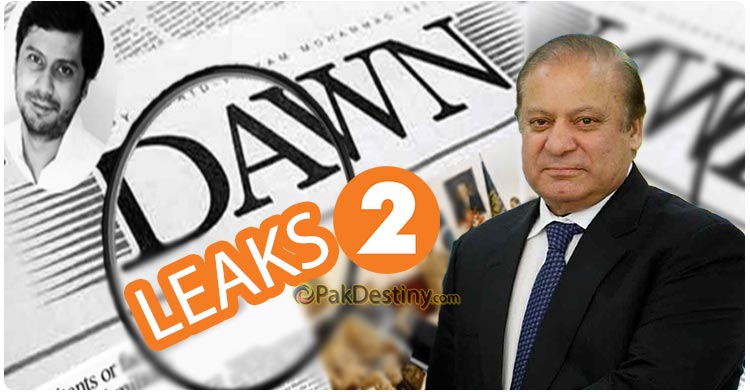
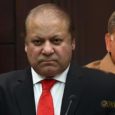
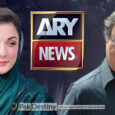
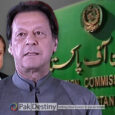
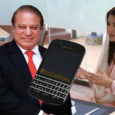
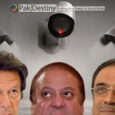
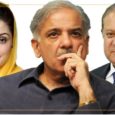
Hez gone crazy insane fulltime
Khota insaan. Gunja gongloo.
چوتیو نیازی کنجر کے کتو نواز شریف نے ٹھیک کہا ھے
lanat hai oye teray pada honay par jahil….
Kashif Khan patwari
pori dunya ko cheekh k btao k hum terrorist hain
doob mro begerat
ye strategies sb mulk krte
lekin koi maanta ni ha
humara begerat leader sb bat maan kr humen zalil krwa rha
Tu idhar udhar ki na baat kar. Tell us how you got all the property in London. NS going crazy and reckless.
Do not challenge the immortals in Pakistan
عمران خان کے ابوجنرل پاشا جنرل پرویز مشرف ،جنرل دارانی۔
آصف زرداری ، حسین حقانی
سب تسلیم کر چکے ہیں کہ ممبئی حملوں میں ملوث لوگ پاکستان سے ہی گئے تھے
یہی بات نواز شریف نے کہہ دی تو تکلیف کیوں ہو رہی ہے ary اور یوتھے تو اسے بونک رے ہیں جسے نیئ بات کر دی
#محب_وطن_نوازشریف
Sab say pehley ye bat GEO ne ki thi or ab nawaz ney ki hey bat tu sachi ho gi magar kuch sachaion ka zikar karna munasib nahe hota. Pakistan q tota koi sachae batata he.? Bas bhutto par ilzam laga kar sach ko daba detey hain.?..Hazoor SAW k wasal k bad kia kia huwa koi zikar karta hey.? Tu sari sachaion ka zikar nahe kia jata.samjhey.
کیا غلط کہتا ہے بھائی نواز شریف ۔۔۔ ہمت کرو اور سوالوں کے جواب دو ۔۔۔ کیا پوری دنیا بشمول چین اور سعودی عرب کے ہمارا بیانیہ یکسر طور پہ مسترد نہیں کرچکے؟ کس کو دھوکا دینا چاہ رہے ہیں ہم ؟؟؟ کیا ہم یہ کہنا چاہ رہے ہیں کہ نواز شریف نے غلط کہا کہ ممبئی حملوں میں پاکستانی کالعدم تنظیمیں ملوث تھیں؟ کیا نہیں تھیں؟ چین سے لوگ گئے تھے ممبئی حملوں کیلئے؟ پاکستان کا بچہ بچہ یہ بات جانتا ہے ۔۔۔ مشرف برملا کہتا رہا ہے ۔۔۔ لیکن چونکہ نواز شریف نے کہ دیا اس لئے وہ غدار اور جنہوں نے یہ کروایا وہ ہمارے ہیرو ۔۔۔ واہ رے خود فریبی
Shoaib Farrukh you mean to say he did the right thing?
100 % right thing … we need to get rid of these militants as well as to update the whole world that we do not own them. This is the only way we may spare us from the isolation
A broken pakistani accent man Kassab never allowed to meet very late permitted pak investigation team (having very limited mandate) under drug whole of trial, traced as pakistani by ‘geo’ said to brought into scene from Nepal.
Very first moment indian media drummed up pak involvement and added more locations different personalities another religion in added days of siege for example they included
a Jews location in the truce added an American, all of sudden hamad karkaray main witness about army involvement on samjhota exp torching brought in to site and killed. There were many glitches and flaws can be dealt if fair and semi open trial was allowed indicated in betrayal of india. Question is why hurriedly our men approved the blame on us while lot of access and question were denied.
Patwari jag gye hn lolx
Shoaib Farrukh What about kalbhushan yadav. Us per ap k leader ki zuban kyoon nahi chalti phir with the same analogy?
یار ۔۔۔ اب تو میرا لیڈر اقتدار میں نہیں ۔۔۔ لٹکاتے کیوں نہیں پھانسی پہ کلبھوشن کو؟ ویسے اقوام متحدہ میں کلبھوشن کے حوالے سے تقریر آج بھی ریکارڈ پر ہے ۔۔۔ یار ہم تو وہ عطیم قوم ہیں جو اپنے ہزاروں شہریوں کے قاتل احسان اللہ احسان کو سینے سے لگائے پھرتی ہے ۔۔۔ صہیب بھائی کبھی ضمیر اجازت دے تو اوپر والوں سے یہ بھی پوچھ لینا کہ اسے کس چکر میں سینے سے لگایا ہوا ہے؟؟؟
PCO Judges K lai Musharraf,
Awaam k lai Zardari.
Syed Mudassar Bukhari nawaz shrif apni london m jaidad bcha rha
money trail.de de na
ap ghaddar ka sath de rhe
ap logon ka hashqr bura hoga
We want complete ban on Dawn media group and article 6 on NS.. Resignation from LNG PM..
I wonder the same thing mushraf durani pasha and many others had said it before and their admition on it on record so what if he said does make any indifference did not we have issues of millitant groups isn’t Pakistan is country where one largest operation against terriosim going on recent reaction by media is totally rediculus and showed how lesser knowledge do we have about media war
Badshaht seen to finish so its do any thing greed is a vice Greed is the all root of evils
b.s…. shows desperation of his oponents
Whoever served this country are called and will be called traitor ,
Liaqat Ali khan sahib
Fatima Jinnah
Zulifiqar Ali Bhutto
Benazir bhutto
Dr. Abdul Qadeer sahib
And now Nawaz shareef
Please stop this bloody game and leave Pakistan alone ……enough is enough